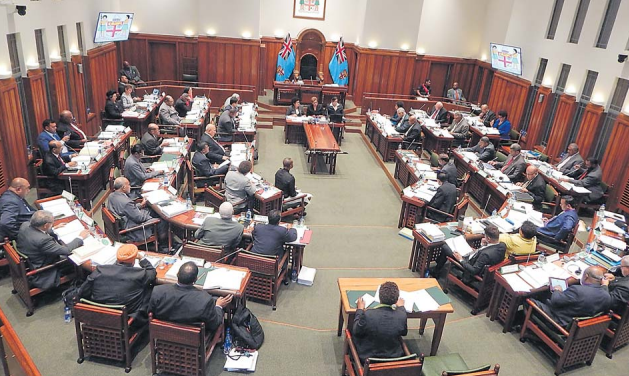Parliament is meant to be the mirror of the people’s will. It is the institution through which citizens’ votes are translated into representation, policies, and national direction. Its legitimacy rests on the principle that the chamber’s composition should remain true to the mandate conferred at the ballot box. In Fiji today, however, that principle has been eroded to the point where the current Parliament can no longer credibly claim to reflect the electorate’s will.
WHEN Fijians voted in December 2022, this was the democratic outcome: Frank Bainimarama’s FijiFirst won the largest share of the vote, around 43 per cent, and secured 26 of the 55 seats. Sitiveni Rabuka’s People’s Alliance amassed around 36 per cent and won 21 seats, while the NFP and SODELPA claimed 5 and 3 seats respectively. This close result revealed an electorate almost evenly divided in its preferences. On paper, Fiji’s Parliament was poised to reflect a balance of power between a robust opposition and a governing coalition.
That balance has since shifted dramatically. The deregistration of FijiFirst removed the country’s largest opposition party from the register, leaving its 26 MPs to sit as independents. More troubling still, several of those MPs have since aligned themselves with the Government.
The effect has been stark. A government that once survived on a knife’s edge now enjoys an inflated majority that the electorate never granted. The Opposition, chosen by nearly half the voters, has been hollowed out. Instead of the finely balanced chamber voters mandated in 2022, Fiji is left with a lopsided legislature tilted heavily in favour of the Government.
This distortion is compounded by the nature of Fiji’s electoral system. Under our open-list proportional representation, most MPs do not enter Parliament on personal popularity, but ride on the strength of their party’s overall vote. Bainimarama alone attracted more than half of FijiFirst’s total votes in 2022, carrying colleagues who individually polled only in the hundreds.
This demonstrates that the mandate was primarily a party mandate. Voters backed FijiFirst’s brand and platform, not its individual candidates. When those same MPs later cross the aisle or align with a rival camp, and take up positions contrary to their party’s stance, they undermine the very basis on which they were elected. The will of their voters is trampled upon.
As a result, Fiji’s current Parliament no longer reflects the will of the people as expressed in the last election. The composition of the legislature has shifted dramatically without any new election to justify it. The Rabuka-led government today wields power far beyond its electoral mandate — a power obtained through backroom deals and opportunism rather than the ballot box.
The contrast between the narrow majority voters actually granted and the dominant position the Government now enjoys is stark. On Christmas Eve 2022, Rabuka secured the prime ministership by a single vote. Had just one MP voted differently, FijiFirst would have remained in power. Fijians expected the 2022–2026 Parliament to be finely balanced and fiercely contested. Instead, as of 2024, the Prime Minister commands a de facto supermajority of loyalists, and can even push through profound changes (like constitutional amendments or major policy reversals) that voters never consented to at the polls.
This disconnect strikes at the heart of democratic legitimacy. When MPs dramatically change sides (especially en masse) the policies being enacted and decisions being made in Parliament lack a moral mandate from the electorate.
Unsurprisingly, public confidence in Fiji’s parliamentary democracy has been shaken. Many now question whether their vote truly matters if parties can be deregistered on technical grounds and representatives can switch allegiances without consulting the electorate. The spectacle of former FijiFirst MPs helping to implement the very agenda they campaigned against is breeding cynicism and apathy among the electorate.
For many observers, this raises broader questions of democratic legitimacy. Can a Parliament that has shifted so far from the election outcome still be said to embody the will of the people? Or has it become more a reflection of political realignments through backroom deals than of the mandate conferred by voters?
These are not abstract concerns. Parliament is the institution entrusted with lawmaking, oversight of the executive, and, critically, the power to amend the Constitution. Those functions demand the highest degree of democratic legitimacy. If the composition of the chamber no longer aligns with what the people voted for, then any exercise of those powers would be seen as lacking in credibility.
As it stands, Fiji’s legislature for the 2022–2026 term is a body elected under one set of promises and alignments and now operating under a completely different set. This profound disconnect has thoroughly discredited the Parliament in the eyes of many. Restoring faith in Fiji’s democracy will require that the composition and conduct of Parliament once again reflect the genuine will of the people – something that, at present, regrettably is not the case.
NILESH LAL is the executive director of Dialogue Fiji which is a movement of non-governmental organisations, and individuals committed to peace building. The views expressed herein are his and not of this newspaper.

